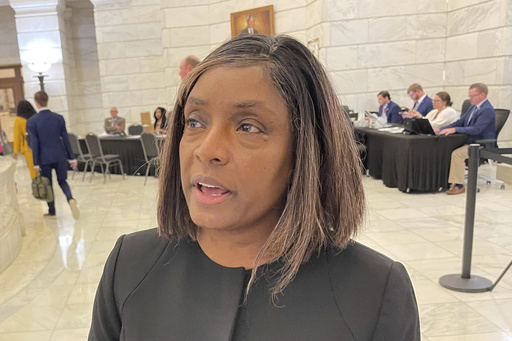
LITTLE ROCK, Ark. — Two justices who have differing opinions on whether Arkansas voters should get the opportunity to modify the state’s abortion ban are currently competing for the position of Chief Justice of the state Supreme Court. This election, however, will not alter the conservative balance of the court.
Justices Rhonda Wood and Karen Baker are both candidates to take over the role from Chief Justice Dan Kemp in Tuesday’s upcoming election. Meanwhile, the state’s four congressional representatives are defending their positions against Democratic challengers. Additionally, voters will vote on a proposed constitutional amendment aimed at revoking the license granted for a casino by a state oversight board.
This election is notable as it marks the first time Arkansas may elect a woman to the role of Chief Justice. Wood and Baker hold opposing views on whether a measure should have been included on the ballot to ease the strict abortion regulations in Arkansas. Wood authored the majority opinion that confirmed the court’s choice to dismiss petitions advocating for the alteration. The court stated that the initiative’s sponsors did not meet the required paperwork standards for paid signature gathering efforts.
In her impassioned dissent, Baker questioned, “What is the reason behind the majority’s intent to deny this particular vote to the people?” Despite the nonpartisan nature of the judicial seats, Wood has garnered support from the Republican Party of Arkansas, Governor Sarah Huckabee Sanders, and Senator Tom Cotton. The Republican Party is already ensured a 5-2 majority within the court, with Sanders preparing to appoint two individuals to the seven-member panel after the election concludes. While Arkansas has had one female chief justice appointed—Betty Dickey, named to the position in 2003 by Governor Mike Huckabee—this would be the first election of a woman to that office.
In congressional races, all four Republican representatives from Arkansas are facing Democratic opponents who seek to dismantle the GOP’s dominance over the state’s federal positions. Representative Rick Crawford is up against Democrat Rodney Govens in the 1st District, which covers eastern Arkansas. Crawford has held his seat since 2010, serving areas like Jonesboro and West Memphis, and he is a key figure on the House Agriculture Committee. Govens brings experience from the telecommunications sector as a resident of Cabot, and Libertarian candidate Steve Parsons is also in the race.
In the 2nd District, which encompasses Little Rock and surrounding regions, Representative French Hill is contending with Democrat Marcus Jones. Hill has held his position since 2014 and serves as vice chairman of the House Financial Services Committee. Jones, a retired Army colonel, has prior experience as the senior Army advisor to the Arkansas Army National Guard.
Over in the northwest 3rd District, Representative Steve Womack is up against Democrat Caitlin Draper, who works as a clinical social worker. Womack has been in office since 2010, serving the district that includes Fayetteville and Fort Smith. Additionally, Libertarian Bobby Wilson is also running in this race. Womack, who holds a significant position on the House Appropriations Committee, previously overcame a primary challenge successfully.
In the 4th District, covering southern Arkansas, Representative Bruce Westerman faces Democrat Risie Howard, an attorney based in Pine Bluff. Westerman has served in the U.S. House since 2014 and leads the House Committee on Natural Resources.
In another significant decision, voters will determine the future of a proposed casino in Arkansas. A ballot measure could potentially block the last of four casinos approved in a previous voter initiative that has incited competition between the Cherokee and Choctaw nations. The amendment would revoke the license granted to Cherokee Nation Entertainment for constructing a casino in Pope County, a decision that has seen the Choctaw Nation invest over $17 million into the campaign in support of this proposal. Under a constitutional amendment passed by voters in 2018, casinos have already opened in the other three authorized locations. Cherokee Nation Businesses has countered this with a campaign investing more than $12 million against the amendment.
State election officials have also blocked other initiatives aimed at lessening the abortion restrictions and expanding the medical marijuana program from making it onto the ballot. Additionally, one measure approved by the state legislature seeks to allocate lottery revenues to support scholarships for vocational and technical educational institutions.
